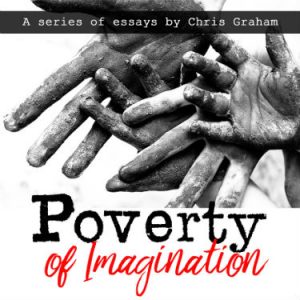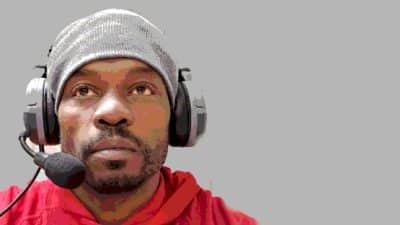1: What keeps us down
2: Growing up humble
3: Divorce impacts last a lifetime
4: Not failing for lack of trying
5: Cashing out at Taco Bell
6: Chris Graham for City Council!
7: Jobs and healthcare vs. Not Donald Trump
8: Surprise ending

Actually, I was the first to even go to college.
My mother had dropped me off four years earlier, and my sister had visited one weekend, but other than that, none of the rest of the DNA pool had ever been on Grounds, which is what we UVA snobs call what you call your campus.
There were two ceremonies, the big one on The Lawn, with people stretching from The Rotunda to Old Cabell Hall, thousands of people, packed like sardines, then the government/foreign affairs department ceremony in Memorial Gymnasium, the old basketball arena where I’d played pick-up ball for the past four years in between classes, papers and exams.
I’d spent the previous four years telling everybody back home how big UVA was, how I was a little fish in a huge pond, but there was something small-town to Mem Gym for me.
I’d won the spring intramural free-throw shooting championship, sinking 24 of the 25 shots to claim the top prize, the spoils being a T-shirt proclaiming me an IM champ.
Along with that came a photo and my name in an enclosure in Mem Gym.
Which I had totally forgotten was there when I was walking my family to their seats before the graduation ceremony.
“Chris, is that you?” my grandmother asked, pointing to the photo.
My mom was there, my dad was there. One of his sisters told me that he was so proud of me, told everybody he ran into that his son was graduating from the University of Virginia, and I smiled, because I figured you were supposed to smile when told something like that, but inside I seethed, because he had nothing to do with it.
I drove home that afternoon, not a long drive: UVA was about 45 minutes away from Mom’s trailer in Crimora.
My best friend since second grade, Brian, hadn’t been on Grounds for the ceremony, but he’d purchased a sort of graduation present for me: a pro wrestling pay-per-view.
Brian was my boy, a huge sports fan, like me, a huge politics gossip, like me, with huge dreams, like me.
Difference was, the world didn’t see him the same way it saw me.
He was set back by terrible shyness in elementary school, and I’m convinced that it was shyness that was at the root of him having been put into a program for extra tutoring, because I always felt of him that he was an intellectual equal, but as kids, you don’t question that kind of stuff.
Brian, like me, was thinking college all the way, but when we were signing up for classes for high school, the guidance counselor didn’t let him sign up for the same classes that I was able to sign up for.
Eighth grade passed, he was stuck in the vocational curriculum, same in ninth grade.
In 10th grade, he was determined that he was going the college-prep route, taking the A classes, and signing up for a language, because you needed three years of a language to get that high-school degree with a college-prep designation.
The counselor wouldn’t allow it. Again.
As this was going on, Brian’s father passed away, way too young, obviously.
All of this was piling up on Brian, and you could see a light turn off.
He just sort of: gave up.
I went on to college. On breaks, I’d hang out with my guy, often talking all night and into the morning, debating some obscure sports topic, politics, culture.
Which gets me to graduation night, and the wrestling show. Brian had been my gateway to pro wrestling, which I used to dismiss as that fake stuff, but Brian was an early devotee, in elementary school.
I finally came around by sixth grade, and became a diehard, but it was totally Brian who sold me on it, and I have to admit, I feel a bit guilty that I would go on to work for several years in the wrestling business, writing a pro wrestling TV show that was broadcast live, which was as cool as it sounds, getting to work with many of our childhood favorites, and it was his dream before it was mine to be able to do that.
It was natural that his graduation gift to me would be to pay for one of these broadcasts that we could watch together.
I don’t remember much from the show. I do remember having a long conversation that went into the early hours of the next morning about the next steps.
The exact words escape me, but my basic message was, Dude, I walked across the stage today with a lot of smart people, and you’re as smart as any of them.
We talked about the history, the elementary school stuff, the guidance counselor keeping him out of the college-prep classes, how much time had passed.
I was trying to convince him to go back to school and work toward a college degree.
In my mind, it made a lot of sense.
It’s probably a good thing that neither of us gave any thought to how hard it was going to be, because it would have ended right there.
I was his tutor, working on some rather basic math stuff at first. I remember how hard it was at the outset going over lowest common denominators and least common multiples, stuff I had taught myself back in fifth grade, when the principal gave me the book and said, basically, finish it at your own pace.
From there, Brian went on to get a degree from the community college, then went on to JMU, all the while working a crap job at Wal-Mart, all day, all night long, collecting carts from the parking lot, and walking them back to the store, 100-degree, humid, summer days, 10 inches of snow on the ground on winter nights.
Brian would eventually work into management, and now runs his own web-based business.
He’s married, has a son, has his own house – like me, he made it out of the trailer park, and damn, it’s awesome to be able to say that, because not many of us did.
So many people that I grew up with held themselves back, but Brian’s story is an example of the system doing its part to hold people back.
I can only imagine that if I was interrogating the guidance counselor who refused to sign off on my boy signing up for the academic-track classes in eighth, ninth and 10th grade, he’d defend himself by referencing scores on some standardized test that would suggest Brian would have difficulty in those classes.
But then, the kid went on to do what he’s done since.
So, what gives?
I mean, let the kid take the classes, and if he can’t hack it, so be it, move him back.
How hard is that?
I can speak with near-certainty that there were kids in those academic-track classes with me from the nice neighborhoods who had absolutely no business being in there.
It didn’t occur to me until later, when I made extra money as a young journalist moonlighting as a tutor for kids at my old high school.
One kid stands out in particular. The kid’s mom hired me to tutor her son in pre-calc, and it was an uphill battle from the first session.
It became apparent to me by about the third session that the kid shouldn’t have gotten past basic algebra, and was only taking pre-calc because his dad worked at GE, and his mom wanted him to go to engineering school.
If this kid was going to be an engineer, it would be the kind involving model trains.
But, they had me as a tutor, and we somehow got the kid through pre-calc. God forbid if he were to have gone on to get into Virginia Tech to actually study engineering based on that experience.
But, see, those kids were given the chance to try and fail. This kid lived in a nice house in a nice subdivision near the hospital.
His parents had good jobs. He wore trendy clothes.
OK, so his test scores weren’t that hot. Maybe he doesn’t test well.
Brian, like other kids from our side of the tracks, couldn’t afford not to test well.
He didn’t wear trendy clothes.
His dad had passed away young, his mom could barely afford to pay the lot rent.
He needed to go to tech school like the other kids from the trailer park.
This was the prevailing attitude, me being the exception.
Not that me being the exception was the greatest thing in the world for me.
As tough as it was for Brian to cope with being held down, I had to deal with straddling two worlds, five days a week.
All of my academic-track classmates were the kids from the middle-class neighborhoods on the good side of the tracks.
I so much wanted to be like them, and be liked by them, but it was going to be hard.
For starters, my mom had a minimum-wage job, and my dad wasn’t paying child support. What do you think that might mean for a kid going back-to-school shopping?
I had one pair of pants in ninth grade, and a different, but still solitary, pair of pants for 10th grade. I didn’t grow that much between 10th and 11th, so I had an extra pair that year.
The years with the single pair were fun. I’d wear the one pair of pants in the closet to school, and if they got dirty, I’d wash them that night, and if they didn’t, good, didn’t have to wash them.
Odd habit that has carried over to adulthood created there: I have a closet full of clothes, but I tend to wear the same pants and same two or three shirts over and over and over.
Having one pair of pants and a couple of shirts isn’t a hardship on the level of what people in Third World countries have to endure, I get that.
But going to an American high school, trying to fit in, as a teen, hardest period of life to make adjustments, still figuring life out, yeah, it was tough.
I’d get invited to birthday parties, and I went to one, just one. It was a bowling party. I didn’t have a gift, for starters. And, again, not the biggest deal in the world, when you consider poverty in Third World countries, but it stands out when you don’t have money for the snack bar, and everybody else around you does, and seems to be having so much fun, eating fries, drinking fountain drinks, simple things, in the grand scheme.
I explained it away by saying I’d just eaten dinner, but I was so, so uncomfortable, with the whole scene, that I never did the birthday party thing again.
I was able, 10th grade, to convince my mom to let me sign up for the debate team, which turned out to be great, because my debate partner and I would go on to win two district and regional championships and place in state twice, but the main reason Mom let me do it was, the debate tournaments were on weekends, and that was when I was at Granny’s, and she could take me and pick me up, because, God forbid.
Well, the weekend thing was true until we got to the tournament season in the spring, and the first district meet was after school mid-week.
Which meant I needed a ride home.
Keep in mind, I was about to win a district championship, but first, needed to arrange a ride home, or I was a no-go.
So, I asked my coach, and she asked one of the seniors who had a drivers’ license if he could take me home.
Suddenly, I was terrified. I didn’t want these kids to know that I lived in a trailer park. I hate to concede this now, but I was ashamed, and I shouldn’t have been, because it wasn’t me that was poor, it was my mom and dad, and they’d dragged my sorry ass down to the poverty level with them.
Even so. The ride home, a medal around my neck, first district debate championship win, and I asked the guy driving me home to let me off at Sammy’s Exxon, because I lived next door, and he could easily turn around in the parking lot.
I lived two miles from Sammy’s Exxon. I walked home, on Route 340, cars whizzing past at 55 miles an hour, the medal around my neck.
Mom, of course, was home. She could’ve picked me up at school, but that wasn’t the point about having me ask for a ride.
That wasn’t why I wasn’t able to play basketball.
She could’ve figured that out. There were any number of ways to figure this stuff out.
You’re reading this now. If you have kids, you go out of your way, way out of your way, to sign them up for sports, for after-school activities, and you run basically a taxi service, taking kids here, there, because that’s what parents do.
Not parents in my ‘hood. We weren’t supposed to think beyond the trailer park, and that thinking was something that was something that I had to fight every single day, an hour each way, riding the bus to and from high school.
In elementary school, it was a big deal that I was the smartest kid in school, a badge of honor.
By high school, there was no honor in being the smart kid.
I read books on the bus. Only fags read books.
I got that, every day.
“Only fags read books.”
The older kids were taking classes at the tech school, which meant they spent half the school day there, with only a couple of classes, English and a basic math class, at the main building.
Did I think I was better than them, taking calculus and Latin and French?
I never did get my ass kicked, but it was threatened to me every day.
Fag boy, look up from your book, I’m going to kick your ass. What, you got a problem?
I started lifting weights the summer after ninth grade. By senior year, I could bench press 300 pounds.
There were only a couple of kids on the football team who could lift that much.
The threats ratcheted down over the years. Peace through strength.
The mental abuse got to be a bit much. Riding the bus, I was getting it from kids who thought I was trying to act like I was better than them, and wanted to punish me for it.
Then at school, I had classes all day long with kids who looked at me like I was a homeless person.
My wife, Crystal, has been a suicide-prevention advocate the past several years, trying to make right a tragedy from her own life, having lost her identical twin sister, Christina, to suicide, when they were 15.
Through her, I’ve learned a lot about suicide ideation, that it gets real when a person starts to think of means, and then begins to plan how to bring suicide into being.
I remember as a teen, dealing with these dueling pressures, from my trailer-park world, and my academic-track world, that I’d occasionally think, I can’t do this.
There was one point where I vividly recall, on a rainy weekend at my grandparents’, thinking, I wish I was dead, and for maybe an hour, I thought it through.
And then a weird thought came to mind: if I’m wishing, why not wish for something good to happen?
It would be a while before whatever good thing was going to come of that to be actualized, but the thought alone was enough for me, though I can’t say that the pain of what I was dealing with ever went away.
Fast forward, real quick, to my senior year in high school.
I’d torn my ACL playing backyard football with a group of friends, the suburban kids, after school, at the end of first-semester exams.
For whatever reason, every single photo of me in the yearbook from senior year had me on crutches. It was only the second half of the year, but whatever.
History has recorded that I spent the entire year on crutches.
I had, by this point, bought the $400 jalopy and gotten an after-school job at Hardee’s, which I had to give up with the knee injury.
Which meant: riding the bus to and from school again.
One day, I needed to stay after to do something for the debate team. A friend offered to give me a ride home.
I was kinda in a corner on this one. I needed to do the after-school thing, and I couldn’t rightly expect to crutch myself from the gas station two miles home.
So, I had to grin and bear it.
I directed her past the gas station, left onto 340, and as we came upon the entrance to the trailer park, I said, Well, so the secret is out. I live in a trailer park.
I don’t remember the conversation from there. I was humiliated.
I didn’t go to school the next day. I remember that.
I did make it back, the following day, and I remember AP English class, after lunch. One friend said they’d joked the day before with the classmate who’d given me the ride home that she was supposed to pick me up for school, forgotten me, but, hey, there’s Chris, on crutches, walking up, poor guy, looks exhausted.
The classroom had a window that looked out the front entrance to the school.
Hey, good one, I thought. Seriously, that was funny.
I never did sense that she told them my secret.
I still held it close to the vest, just in case.
See, the obstacles, moral of the story here, didn’t have to be real, to be tangible, to risk getting in the way.
I was on the phone with my sister’s softball coach. Just back from my first year at UVA, my sister was 13, and she was a good softball player, and I’m underselling her there.
She could hit, was the cleanup hitter on her team, and she was the number-one pitcher, a lefty with a good fastball and great control.
Her coach wanted her to play that summer with his travel team, and I was excited for her, that this opportunity was coming her way.
She wasn’t home, so the first person I shared this news with was Mom, when she got back home from getting groceries.
The response wasn’t what I’d expected.
Who’s going to take her to practice and the games?
This was my youth sports career coming to an end all over again.
By this point, Mom had been dating a guy named Gary for a couple of years, and her weekends were spent at his trailer down past Greenville, a half-hour away.
My sister and I had been spending those weekends at my grandparents house in Staunton, which was good for me, because Granddaddy had bought a satellite dish and big-screen TV, and I could watch literally any baseball game I wanted to in the summer, and track down territory wrestling shows on the far-flung sports networks.
But as far as getting my sister to and from practices during the week and games on the weekend, well, that one was going to be tough.
I was working two jobs that summer, a day job with the county school system, and Friday-Sunday at Hardee’s in Waynesboro, nights.
I was more than willing to pitch in and take her to practice and to games when I could, because I didn’t want to see her lose this chance.
But Mom was having none of it. Her work schedule was changing, she claimed, and though it didn’t, and I was sure it wasn’t going to, because that was the same argument that ended my basketball career in eighth grade, what was I going to do, tell her that I knew she was lying?
I was more than welcome to take her to practices and games. She wasn’t going to.
Long story short, my sister’s softball career ended there.
The coach called back a couple of times, but it was a lost cause.
Fast forward, now, to spring break, the next year. I’m back in town hanging out with a cousin who was a year behind me in school. Cruising Downtown Waynesboro on the Friday night of my spring break, he broke some uncomfortable news to me.
Chris, man, I don’t know how to say this, so I’m just going to say it.
Your sister is … wild.
Which, it didn’t register with me right away. I’m thinking, wild? So, she’s 14, she’s hanging out with some girls from the trailer park, one of them has a car, maybe, they’re cruising downtown and getting in trouble?
No. She’s … wild.
I got it now.
I came home for Easter, and Mom was working one night, and I got back to a party scene at the trailer, hosted by my sister, maybe six, eight kids all told, equal number of girls and guys.
I was college-football-player-size, and a few years older, and not happy.
I ordered everybody out, and I remember one of the guys was a bit recalcitrant in terms of following along, sitting stubbornly on the couch, staring straight ahead, looking like he wanted to fight.
Being the big brother, I made it clear: out, now.
My sister said something to me about not talking to him like that, he plays football at Wilson, which meant, you know, basically nothing, because the football team was winning a game or two a year back in those days.
Good, then he knows how it feels to get his ass kicked, was my response.
The kids left that night, but my sister was … wild.
She’d end up being a teen mother: my eldest niece was born when her mother was finishing up her senior year in high school.
History would continue to repeat itself: like Mom and Dad, my sister and her husband would go through a bitter divorce, leaving the kids, Kayla and the twins, Hannah and Rachel, to pick up the pieces, like we had a generation before.
And now, yeah, we’re heaping insult upon injury: the twins are following in the footsteps.
I tried, in vain, to get across to the girls how hard life had been for my mother: she was married to my dad for 13 years, he left her with two kids and no money, then she wasted another 10 years on that Gary guy, a belligerent, racist drunk who didn’t want to be around her kids, and she chose him over her kids, then she ended up married to another belligerent racist in Maryland, where she lived the last six years of her life, homesick, before dying of lung cancer at age 62.
They kind of knew what it had meant for my sister, their mother: I lost track of how long her first marriage lasted, but it was around seven or eight years, and when that ended, she took in a drug dealer facing child molestation charges who would eventually end up in prison for second-degree murder, ahead of a seemingly endless string of shorter relationships, trailer parks, apartments.
It’s depressing, to see the cycle continuing.
You can bet that I wonder, not often, but certainly occasionally, what happens to my sister if she’d been able to play travel softball that summer when she was 13?
It’s not automatic that she ends up being a teacher or business professional or happily married with kids who are nurtured into doing even better than their mother.
But, if she’s playing softball that summer, she’s probably playing in high school.
Maybe being in a team sports environment gives her another perspective on how you’re supposed to carry yourself.
Not saying here that athletes of either gender don’t still go wild in high school, but I’d think with teen girls there’d be an extra set of expectations that would come with playing a sport, that you’d at least be less likely to engage in the kinds of behaviors, particularly the promiscuous sex part of being wild, that could result in you falling out of sports.
When I say my sister was a potential star player, this is the award-winning sportswriter in me writing that.
We had a cousin who was a star youth and high-school softball player who ended up playing in college.
My sister was as good. I’m not saying better, but she was as good.
Maybe, if she plays that summer, ends up playing in high school, she ends up going to college.
She had that potential, academically. When she had to leave school her senior year as her due date came near, I actually talked my way into the job through the county school system to serve as what they called her homebound instructor.
The job was to connect with her teachers a couple days a week, get her assignments, and basically teach them to her.
They paid me $12 an hour to do this, which was a nice supplement to what I was making as a part-time cub reporter at the local paper at the time.
I think my sister thought at the outset that I was going to make it easy on her, help her complete her assignments, that kind of thing, but, nope.
One of her assignments was to read MacBeth, and we read it, acted it out, the whole thing, out loud.
She was an honor-roll student her senior year, which told me, had she applied herself, she’d have been that all the way through.
My mom didn’t care. She was more focused on shacking up on weekends with a drunk racist idiot than she was her teenage daughter running the streets going wild.
That my sister went from this to an adulthood in which she has moved from one abusive relationship to another to another should be no surprise.
This was how she was raised.
It all started, if you ask me, that summer and that call from the travel softball coach.
The bill from my mom not being willing to let her play was paid by my sister, by her daughters, who had to endure living with a child molester who ended up in prison for murder, and is now falling to a third generation.
As for me, I went dramatically in the other direction with respect to the kids question. I didn’t even get married until I was 27, practically a grandpa in the context of the milieu in which I grew up.
My contribution to the decision-making about kids in discussions with Crystal was, Let’s wait until we get financially stable, and a succession of five-year plans that became a sort of self-fulfilling prophecy, continually throwing the final call out into the future.
My thinking being, I’m not going to bring a kid into this world the way I was brought into this world, something that Crystal, who also came from a difficult family situation, enduring her parents’ divorce, her mother entering into a seemingly endless series of ultimately fruitless relationships, and her twin’s suicide at 15, was in lockstep agreement with in that sense.
It finally got to a point where we tabled the most recent five-year plan indefinitely, though we’re now more than financially stable enough to be able to provide a good life for a good kid or kids.
Upon reflection, I have come to realize the reasons I never really wanted to have kids, even when I mouthed the words that I did, for years and years.
I couldn’t stop the cycle of kids not being raised right that started with my parents, but I could damn sure stop it at me.










